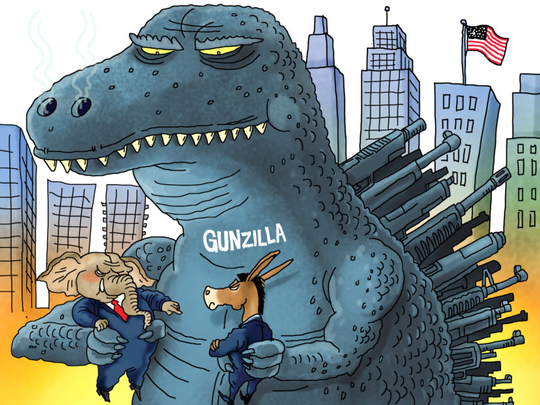
Seven years ago, Gulf News had asked me to write a long article for the paper’s Weekend Review section, explaining America’s gun culture — or at least trying to put it into some context.
At the time, I wrote: “What many non-Americans find disconcerting is the way US politicians and their constituents tend to look at all that violence and see reasons why the country needs more, not fewer, guns.”
I cited, as an example, a 1991 shooting in Killeen, Texas, that left 23 people dead. At the time it was the deadliest mass shooting in modern United States history, though by the time I wrote that article it had been surpassed by the 2007 massacre at Virginia Tech University. With 49 people dead, this month’s shooting in Orlando, in turn, surpassed Virginia Tech.
The 1991 killings in Texas led to the quick demise of a gun-control measure then making its way through Congress and to moves in Texas to loosen the state’s already very loose gun laws. The state’s governor at the time, Ann Richards, vetoed the bill. When she ran for reelection a few years later, that fact was used against her by her opponent: George W. Bush, who promptly signed the bill into law after ousting Richards as governor.
A partisan issue
In the quarter of a century since Killeen, massacres have become grimly common in the US. What has changed is the degree to which guns are now a partisan issue.
A Gallup poll conducted in the days after the Orlando shooting found that 79 per cent of Republicans saw the massacre as an act of terrorism while “60 per cent of Democrats interpret it as domestic gun violence”. (Critics noted that those choices are not mutually exclusive and faulted the poll for failing to offer respondents the choice of “both”).
Among Republicans, pledges to defend gun rights at all costs remain standard rhetoric. But as those poll numbers indicate, something may be changing among Democrats.
Throughout the just-concluded primary season, Hillary Clinton was relentlessly critical of her rival, Senator Bernie Sanders’, pro-gun record over his 26 years in Congress. In part, this was tactical: Sanders’ entire campaign was built on making Hillary look too centreist and guns were the one area where she could easily run to his left (Sanders — and my — home state of Vermont has some of the loosest gun laws in America, a fact that belies the oft-heard idea that love of guns is somehow restricted to the America’s South and West).
But Hillary, along with US President Barack Obama, also seems to sense that something in America is changing and that there are votes to be won by advocating for “sensible gun control”. Among Democrats, this translates as closing loopholes that make guns especially easy to purchase at gun shows and over the internet, and blocking sales to people on the government’s terrorist watch list.
Anywhere outside America, that hardly sounds like a tough, anti-gun agenda. Yet, it makes Hillary the most pro-gun control (or anti-gun, depending on your point of view) presidential nominee in decades, and it represents an enormous change. Few Democrats of the last generation would have dared take the positions Hillary has now embraced. Yet, today, the push to enact at least this modest form of gun control has emerged as a litmus test among many Democrats.
It is also one of the reasons why a warning that Hillary “plans to repeal the Second Amendment” (the bit of the US Constitution that guarantees a “right to keep and bear arms”) has become a standard part of Donald Trump’s stump speech. Trump, in turn, picked this line up from Texas Senator Ted Cruz, a candidate who demonstrated his own devotion to firearms last year by posting a video of himself cooking bacon by wrapping it around the barrel of a machine gun he was firing at a target range.
Needless to say neither Clinton nor Obama has ever proposed — let alone tried — repealing the Second Amendment. What the coming months will test is whether this accusation has the same clearing-all-before-it sort of resonance that it has long held in US politics.
Two very different things
Having said all that, however, I must also end with a reality check. Support for modest gun control may now be almost required among Democrats, but that does not mean it is actually going to happen. Even in the unlikely event that the party sweeps back to control of Congress this autumn supporting something in theory and getting it enacted into law remain two very different things. And even if that did, indeed, happen no one is actually proposing confiscating the 350 million or so guns that Americans now own (because there is no central registry no one knows the actual number).
So that sad truth is that whatever the outcome of the election there will be more shootings, and, with them, more recriminations, more partisan finger-pointing. As I wrote in these pages seven years ago: “For the foreseeable future the US seems set to remain the most heavily-armed country in the Western world. Its gun culture is built from equal parts tradition and fear; uniquely enduring and uniquely American.”
Gordon Robison, a longtime Middle East journalist and US political analyst, teaches political science at the University of Vermont.







